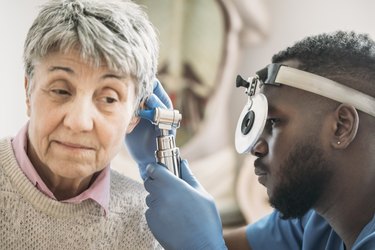
If you regularly notice an unprompted ringing or whooshing sound in your ears, you may have tinnitus. While there are a number of common causes of the condition, a lack of certain vitamins can sometimes be to blame. But what vitamin deficiency causes ringing in the ears, exactly?
Tinnitus — which can also sound like pulsing, buzzing, roaring, clicking, hissing or humming — may affect as many as 20 percent of people (particularly older adults), according to the Mayo Clinic. It's usually the result of age-related hearing loss, an ear injury or infection, circulatory problems or a medication side effect.
Video of the Day
Video of the Day
But sometimes tinnitus is a symptom of insufficient vitamin intake. Here's what vitamin deficiencies cause ringing in the ears and what to do about it.
Tip
Tinnitus can also be indicative of an underlying condition like Meniere's disease or atherosclerosis, per the Mayo Clinic, so it's important to be evaluated by a doctor before trying any supplements.
Vitamin B12
Vitamin B12 is an essential nutrient that helps produce red blood cells and supports nervous system function, per Harvard Health Publishing.
But a lack of the nutrient can cause the protective sheath around your nerves to deteriorate. This can lead to a breakdown in nerve communication that may contribute to symptoms like ringing ears, according to March 2016 research in Noise & Health.
Per Harvard Health Publishing, other symptoms of low vitamin B12 besides tinnitus include:
- Strange feelings, numbness or tingling in the hands, legs or feet
- Difficulty walking and balancing
- Weakness
- Difficulty thinking
- Memory loss
- Fatigue
- Anemia
- Swollen tongue
Fix it: If you show signs of a vitamin B12 deficiency, visit your doctor to get a blood test to check for the condition. From there, they can help you determine the best treatment, including what the best vitamin for your tinnitus is or whether you should eat more food sources of vitamin B instead.
Tip
Check with your doctor before starting any supplements to tackle ear ringing from vitamin deficiency, as the FDA does not require supplements to be proven safe or effective before they are sold, so there’s no guarantee that any supplement you take is safe, contains the ingredients it says it does or produces the effects it claims.
Vitamin D
Vitamin D is a critical nutrient that helps you absorb calcium to keep your bones strong, according to the Cleveland Clinic.
And this vitamin deficiency may also cause ringing in the ears. That's because a vitamin D deficiency may damage nerve communication and affect how your body is able to process calcium, both of which could impair ear function and lead to symptoms like tinnitus, per an August 2021 study in PLOS One.
In fact, the same study — which evaluated 201 people with tinnitus — found that nearly 51 percent of them had low levels of the nutrient.
Indeed, it appears that vitamin D deficiency may cause tinnitus in certain cases. Per the Cleveland Clinic, other signs of a vitamin D deficiency besides ringing in the ears include:
- Fatigue
- Bone pain
- Muscle weakness, aches or cramps
- Mood changes
Fix it: If you suspect you have vitamin D tinnitus, visit your doctor to confirm your condition with a blood test. Then you can work with your doctor to determine the best way to get enough of the nutrient and avoid tinnitus from a vitamin deficiency.
Can Low Potassium Cause Ringing in the Ears?
While there's no evidence that links tinnitus to this nutrient deficiency in your diet, low potassium levels can cause health problems of their own, per the U.S. National Library of Medicine. Symptoms can include:
- Constipation
- Feeling of skipped heart beats
- Fatigue
- Muscle damage, weakness or spasms
- Tingling or numbness
- Mayo Clinic: "Tinnitus"
- Harvard Health Publishing: "Vitamin B12 deficiency can be sneaky, harmful"
- Noise & Health: "Therapeutic role of Vitamin B12 in patients of chronic tinnitus: A pilot study"
- PLOS One: "The role of vitamin D in subjective tinnitus—A case-control study"
- Cleveland Clinic: "Vitamin D Deficiency"
- U.S. National Library of Medicine: "Loe blood potassium"
- FDA: “FDA 101: Dietary Supplements”
Was this article helpful?
150 Characters Max
0/150
Thank you for sharing!
Thank you for your feedback!